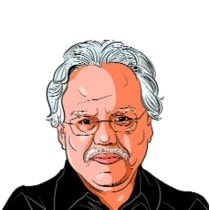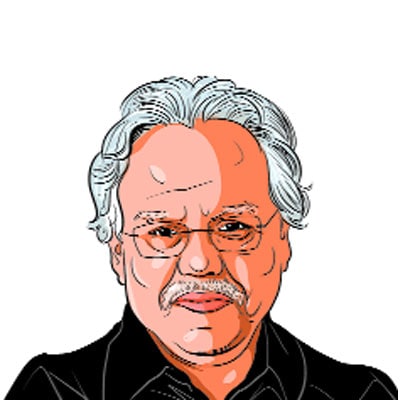A lesson from Arunachal Pradesh
Debate over the state’s anti-conversion law points to the need to give more attention to religious change from the perspective of the ‘converted’.

Arunachal Pradesh is unlike the other states with anti-conversion laws. Christians constitute more than 30 per cent of the state’s population. (Illustration: CR Sasikumar)
The statement by the BJP Chief Minister of Arunachal Pradesh, Pema Khandu, that he would move to repeal the state’s freedom of religion or anti-conversion law at the next assembly session has drawn significant national attention. The announcement was later modified following BJP general secretary Ram Madhav’s tweet that questioned the report’s accuracy. He said that Chief Minister Khandu had not promised anything more than “a wide-ranging consultation” about the anti-conversion law’s efficacy. Subsequently, Arunachal’s information minister said that Khandu did not say that the law would be repealed. Apparently, the plan all along had been for the Cabinet to examine the anti-conversion law, consult stakeholders, and discuss the matter in the state assembly before deciding if it needs to be repealed.
Nonetheless, it may be rewarding to pay attention to the context in which Khandu made the suggestion, and to his public reasoning in favour of repeal. The chief minister made the announcement at a ceremony marking the 10th anniversary of the death of the pioneer Catholic missionary, Henry Gaikwad — popularly known as Prembhai — who travelled and preached in the remote mountain villages of Arunachal in the 1980s and 1990s. The austere lifestyle, service, and self-sacrifice of this man from distant Maharashtra endeared him to many Arunachalis. Khandu, a Buddhist, described Prembhai as a “saint” who brought tremendous changes in the lives of the Nyishi people — one of the state’s largest communities distributed across five districts as well as parts of Assam. Through 25 years of humanitarian service to the state, he said, Prembhai earned the respect of people far beyond his faith.
A number of other important political figures of the state attended the event. Among them were former Chief Minister Nabam Tuki, a Catholic, and Nabam Rebia, former speaker of the Arunachal assembly and Khandu’s cabinet colleague. Rebia describes himself as a “non-baptised Christian”, following a familiar pattern of conduct that adapts to Indian conditions: Churchless Christianity, that is accepting Christianity but rejecting the Church as an institution. Another speaker, the president of the Congress, Sanjay Takam, has long been critical of the state’s anti-conversion law.
Arunachal Pradesh is unlike the other states with anti-conversion laws. Christians constitute more than 30 per cent of the state’s population. By contrast, in four other states with such laws — Gujarat, Himachal Pradesh, Madhya Pradesh and Uttarakhand — Christians are less than one per cent. In Chhattisgarh, Odisha and Jharkhand, where similar laws exist, they are between 2 per cent and 4 per cent. In Tamil Nadu, where an anti-conversion ordinance was in place for a while, the percentage of Christians is higher: 6 per cent. The fact that the then chief minister J Jayalalithaa withdrew the ordinance following the defeat of the NDA-AIADMK alliance in the 2004 general election is telling.
It is hardly surprising that a law that has a history of mobilising majorities at the cost of alienating tiny and politically marginal minorities would face a different set of challenges in Arunachal Pradesh.
Khandu observed at the memorial meeting for Prembhai that the anti-conversion law is “probably targeted towards Christians”. He expressed the fear that the “chief minister, chief secretary or DGP (director general police)” can easily misuse this law and that it “could trigger largescale violence in the state and could break Arunachal into pieces”. The concern for public order should be familiar to students of India’s anti-conversion laws. When the Supreme Court in 1977 upheld the constitutionality of the anti-conversion laws of Madhya Pradesh and Odisha, it relied on the public order exception of Article 25 of the Constitution that permits restriction on “the right freely to profess, practise and propagate religion”. Khandu has the same concern. However, he wisely foresees that the challenge to public order might take a very different form in Arunachal Pradesh than in these other states.
As would be evident by now, Christians in Arunachal Pradesh include prominent members of the political elite. As in the rest of Northeast India, they include all sections of society. The dominant Indian discourse on conversion, which is focused on the supposed gullibility of our poor and underprivileged countrymen, and the fear that they may fall prey to the machinations of foreign missionaries, is unsustainable in this region. It is hard to think of your colleagues and friends as passive converts who were tricked into conversion by material inducements. This has important lessons for the rest of India.
The Naga leader Angami Zapu Phizo had famously said, “We do not take Christianity as foreign religion any more than we consider the light of the sun as foreign.” Western missionaries may have pioneered proselytisation and conversion during British colonial rule. But for a long time, the agents of proselytisation have been locals and other Indians. Among Christian denominations that have a significant presence in Northeast India are some that emphasise missionary work as an essential part of the Christian faith. Thus many Rabhas of western Assam converted to Baptist Christianity because of the efforts by Mizo missionaries. Ironically, their conversion occurred only after the Indian government expelled a group of Australian missionaries working among them. It is not surprising that Mizo missionaries — regional neighbours of the Rabhas — were far more successful proselytisers than their Australian forerunners.
Northeasterners today account for a significant number of Christian missionaries in India. Their commitment to missionary work has taken some of them to other parts of the world as well.
In their book on Christianity, colonialism, and consciousness in South Africa, anthropologists Jean and John Comaroff have observed that, “the very use of ‘conversion’ as a noun leads, unwittingly, to the reification of religious ‘belief.’” It “makes spiritual commitment into a choice among competing faiths, and ‘belief systems’ into doctrines torn free of all cultural embeddedness.” Other scholars studying religious change have noted that the word “conversion” says more about the intentions of missionaries than about the experience and consciousness of the converted.
In India, it is common to hear the expression “they were converted”. But we don’t hear “they converted” as often. One hears “we converted” or “I converted” even less. For a person who decides to turn to a new religion, the switch probably does not need an explanation, or at least not a this-worldly explanation. It is unlikely he or she would talk about it with someone outside his or her faith.
The fact that changing nationality comes so naturally to many Indians while changing religion becomes so controversial probably intrigues many outsiders.
James C Scott, author of a number of influential books based on Southeast Asian history, suggests that the appeal of Christianity in the hill societies of the region — including Northeast India — is that it constitutes “a powerful, alternate and to some degree oppositional, modernity”. The phenomenon, he suggests, is best understood in the context of a long prior history of these societies adopting religious identities at variance with those of the people of the valley states whose cultures have long stigmatised them.
It is about time we give more attention to religious change from the perspective of the “converted” and give up the illusion that the possession of free will and autonomy are the exclusive prerogatives of mainstream elites.
The writer is Professor of Political Studies, Bard College, New York
For all the latest Opinion News, download Indian Express App
More From Sanjib Baruah
- Citizens, non-citizens, minoritiesUpdating of the National Register of Citizens in Assam and the Citizenship Amendment Bill could lead to a redrawing of the demographic map of South…
- Stateless in AssamThousands could be declared non-citizens when the National Register of Citizens is finalised. Since their deportation is an almost impossible option, the focus will be…
- How we define Assam’s flood problem... is crucial to any attempts towards addressing it. It will require a careful consideration of the history of the state’s complex encounter with floods..








































No hay comentarios:
Publicar un comentario